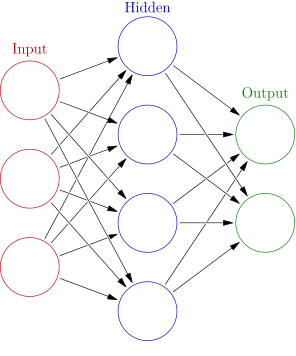|
Weekend Educational Course
Image Acquisition & Reconstruction |
|
Image Acquisition & Reconstruction: Part 3
Weekend Course
ORGANIZERS: Edward DiBella, Neville Gai, Vikas Gulani, Ileana Hancu
Sunday, 17 June 2018
| N02 |
13:15 - 14:35 |
Moderators: Jeffrey Fessler, Berkin Bilgic |
Skill Level: Basic to Intermediate
Session Number: WE-14C
Overview
This course will describe MRI acquisition and reconstruction methods. More advanced acquisitions including non-Cartesian, motion sensitization/compensation, as well as artifaction reduction strategies will be described. Advanced image reconstruction methods that leverage coil sensitivity information and other constraints will be presented, including fingerprinting and simultaneous multi-slice methods.
Target Audience
Physicists and engineers who wish to acquire an understanding of aspects of MR imaging, including non-Cartesian k-space acquisition methods and under-sampled image acquisition and reconstruction.
Educational Objectives
As a result of attending this course, participants should be able to:
-Describe various methods and pulse sequences for acquiring MRI data;
-Discuss current motion sensitization and compensation techniques; and
-Compare and contrast several current methods for reconstruction of under-sampled data.
| |
Image Reconstruction |
13:15
|
|
 Parallel Imaging Parallel Imaging
Suchandrima Banerjee
With the increasing use of multicoil array for MR signal reception, and motivated by the need to increase acquisition speed, parallel imaging has become as essential part of MR scans. This talk will aim to impart basic understanding and develop an intuition for underlying concepts of parallel imaging reconstruction with a focus on most widely used methods such as SENSE and GRAPPA. Dynamic acceleration and extension to non-cartesian trajectories will be touched upon and the impact of parallel imaging reconstruction on signal-to-noise will be discussed.
|
13:35
|
|
 Basic Sparsity & Compressed Sensing Basic Sparsity & Compressed Sensing
Michael Lustig
|
13:55
|
|
 Low-Rank Methods Low-Rank Methods
Bradley Sutton, Xi Peng, Fan Lam, Zhi-Pei Liang
For dynamic imaging or parameter mapping applications, there is a significant amount of spatiotemporal correlations in the data, with many parts of the image sharing similar temporal signal profiles. This results in a data matrix that is low rank. Several methods have been developed to exploit this low-rank structure to achieve very high imaging speed. This talk will describe these low rank methods and demonstrate the imaging speed that can be achieved.
|
14:15
|
|
 Dictionary & Model-Based Methods Dictionary & Model-Based Methods
Mariya Doneva
This lecture explains the principles of model-based reconstruction methods and their linearization using dictionaries for MR parameter mapping.
|
14:35
|
|
Break & Meet the Teachers |
|
| |
|
Image Acquisition & Reconstruction: Part 4
Weekend Course
ORGANIZERS: Edward DiBella, Neville Gai, Vikas Gulani, Ileana Hancu
Sunday, 17 June 2018
| N02 |
15:15 - 16:55 |
Moderators: Berkin Bilgic, Jeffrey Fessler |
Skill Level: Basic to Intermediate
Session Number: WE-14D
Overview
This course will describe MRI acquisition and reconstruction methods. More advanced acquisitions including non-Cartesian, motion sensitization/compensation, as well as artifaction reduction strategies will be described. Advanced image reconstruction methods that leverage coil sensitivity information and other constraints will be presented, including fingerprinting and simultaneous multi-slice methods.
Target Audience
Physicists and engineers who wish to acquire an understanding of aspects of MR imaging, including non-Cartesian k-space acquisition methods and under- sampled image acquisition and reconstruction.
Educational Objectives
As a result of attending this course, participants should be able to:
-Describe various methods and pulse sequences for acquiring MRI data;
-Discuss current motion sensitization and compensation techniques; and
-Compare and contrast several current methods for reconstruction of under-sampled data.
| |
Image Reconstruction |
15:15
|
|
 MR Fingerprinting: Introduction MR Fingerprinting: Introduction
Martijn Cloos
Magnetic Resonance Fingerprinting (MRF) is an exciting new framework to rapidly acquire simultaneous quantification of multiple tissue properties, but what is it that distinguishes MRF from other quantitative MR techniques?
|
15:35
|
|
 MR Fingerprinting: Reconstruction Considerations MR Fingerprinting: Reconstruction Considerations
Debra McGivney
This lecture will outline various considerations associated with the quantification of tissue properties in the framework of MR fingerprinting
|
15:55
|
 |
 Machine Learning: Introduction Machine Learning: Introduction
Lennart Schlieder, Martin Uecker
Machine learning has been a hot topic lately due to the substantial advances in classification, image segmentation and many other tasks where the best-performing methods are now often based on deep neural networks. Machine learning can be applied even when a mathematical description of the model is not at hand or too complicated. This talk will give a brief introduction to machine learning with a focus on artificial neural networks.
|
16:15
|
|
 Machine Learning: Practical Approaches to Reconstruction Machine Learning: Practical Approaches to Reconstruction
Mehmet Akçakaya
Machine learning methods have found wide use in MRI reconstruction, with a recent focus on artificial neural networks, in particular convolutional neural networks. In this talk, we will overview both model-based and data-driven machine learning approaches for reconstruction. We will also consider practical aspects of implementing deep artificial neural networks for MRI reconstruction.
|
16:35
|
|
 Alternate Reconstruction Workflows: Practical Experience Alternate Reconstruction Workflows: Practical Experience
Craig Meyer
This educational talk will discuss image reconstruction software platforms that go beyond the platforms provided by the vendors. These platforms can be used for prototyping new reconstruction methods and for enabling capabilities such as real-time interactive scanning. Open-source image reconstruction software libraries accelerate image reconstruction research and enable reproducible research.
|
16:55
|
|
Adjournment & Meet the Teachers |
|
| Back |
| The International Society for Magnetic Resonance in Medicine is accredited by the Accreditation Council for Continuing Medical Education to provide continuing medical education for physicians. |


